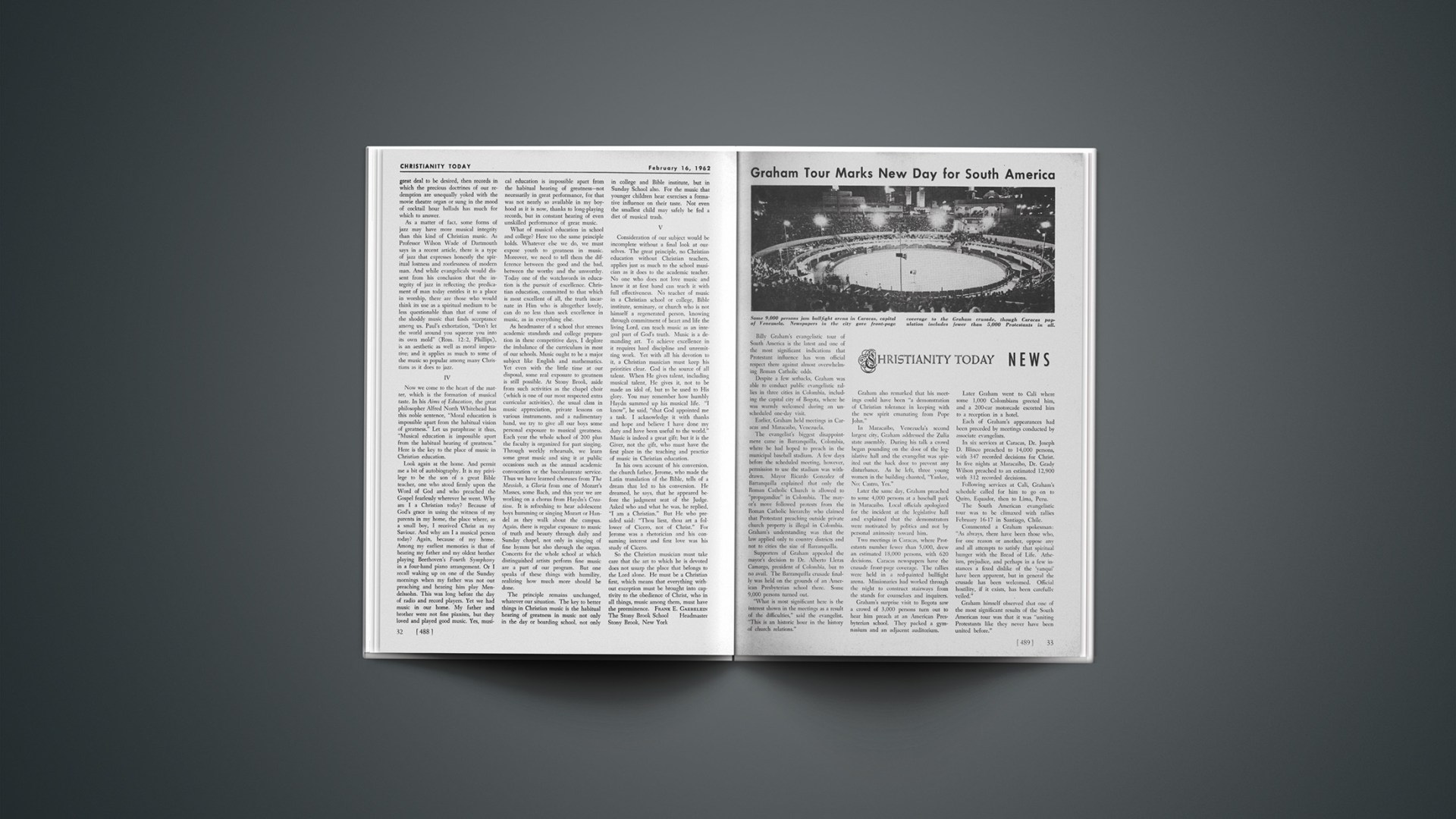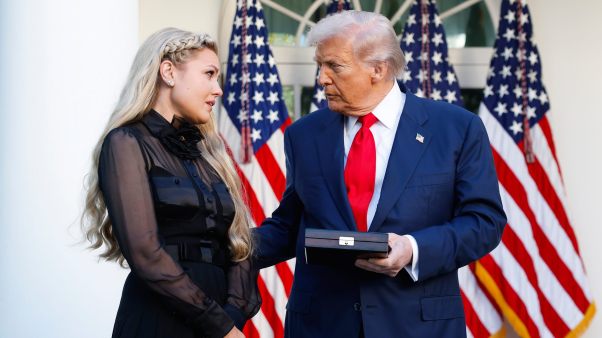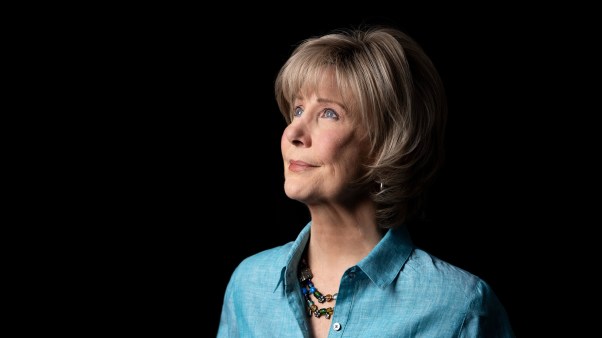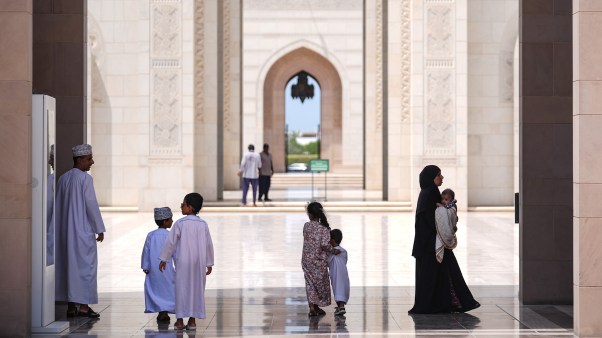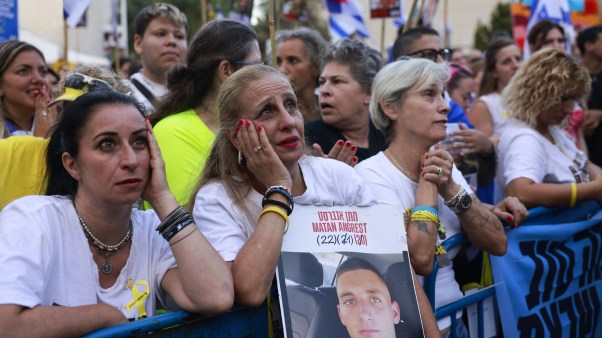Billy Graham’s evangelistic tour of South America is the latest and one of the most significant indications that Protestant influence has won official respect there against almost overwhelming Roman Catholic odds.
Despite a few setbacks, Graham was able to conduct public evangelistic rallies in three cities in Colombia, including the capital city of Bogota, where he was warmly welcomed during an unscheduled one-day visit.
Earlier, Graham held meetings in Caracas and Maracaibo, Venezuela.
The evangelist’s biggest disappointment came in Barranquilla, Colombia, where he had hoped to preach in the municipal baseball stadium. A few days before the scheduled meeting, however, permission to use the stadium was withdrawn. Mayor Ricardo Gonzalez of Barranquilla explained that only the Roman Catholic Church is allowed to “propagandize” in Colombia. The mayor’s move followed protests from the Roman Catholic hierarchy who claimed that Protestant preaching outside private church property is illegal in Colombia. Graham’s understanding was that the law applied only to country districts and not to cities the size of Barranquilla.
Supporters of Graham appealed the mayor’s decision to Dr. Alberto Lleras Camargo, president of Colombia, but to no avail. The Barranquilla crusade finally was held on the grounds of an American Presbyterian school there. Some 9,000 persons turned out.
“What is most significant here is the interest shown in the meetings as a result of the difficulties,” said the evangelist. “This is an historic hour in the history of church relations.”
Graham also remarked that his meetings could have been “a demonstration of Christian tolerance in keeping with the new spirit emanating from Pope John.”
In Maracaibo, Venezuela’s second largest city, Graham addressed the Zulia state assembly. During his talk a crowd began pounding on the door of the legislative hall and the evangelist was spirited out the back door to prevent any disturbance. As he left, three young women in the building chanted, “Yankee, No; Castro, Yes.”
Later the same day, Graham preached to some 4,000 persons at a baseball park in Maracaibo. Local officials apologized for the incident at the legislative hall and explained that the demonstrators were motivated by politics and not by personal animosity toward him.
Two meetings in Caracas, where Protestants number fewer than 5,000, drew an estimated 18,000 persons, with 620 decisions. Caracas newspapers have the crusade front-page coverage. The rallies were held in a red-painted bullfight arena. Missionaries had worked through the night to construct stairways from the stands for counselors and inquirers.
Graham’s surprise visit to Bogota saw a crowd of 3,000 persons turn out to hear him preach at an American Presbyterian school. They packed a gymnasium and an adjacent auditorium.
Later Graham went to Cali where some 1,000 Colombians greeted him, and a 200-car motorcade escorted him to a reception in a hotel.
Each of Graham’s appearances had been preceded by meetings conducted by associate evangelists.
In six services at Caracas, Dr. Joseph D. Blinco preached to 14,000 persons, with 347 recorded decisions for Christ. In five nights at Maracaibo, Dr. Grady Wilson preached to an estimated 12,900 with 312 recorded decisions.
Following services at Cali, Graham’s schedule called for him to go on to Quito, Equador, then to Lima, Peru.
The South American evangelistic tour was to be climaxed with rallies February 16–17 in Santiago, Chile.
Commented a Graham spokesman: “As always, there have been those who, for one reason or another, oppose any and all attempts to satisfy that spiritual hunger with the Bread of Life. Atheism, prejudice, and perhaps in a few instances a fixed dislike of the ‘yanqui’ have been apparent, but in general the crusade has been welcomed. Official hostility, if it exists, has been carefully veiled.”
Graham himself observed that one of the most significant results of the South American tour was that it was “uniting Protestants like they never have been united before.
Iakovos Of Greece
In the 12 days he was in office as Primate of the Orthodox Church in Greece, Archbishop Iakovos saw develop about him a historic scandal.
The 66-year-old prelate was elected January 13, five days after the death of the predecessor, Archbishop Theoklitos. He won 33 of the 57 votes cast at a secret conclave of bishops.
A public furor ensued. A parish priest formally lodged a charge of “unmentionable acts” against the new primate, and within three days an ecclesiastical inquiry was ordered into his private life.
Archbishop Iakovos (no kin to the WCC president) resisted initial demands that he resign. Only after the government began drafting special legislation to force an abdication did he agree to step down “to avert state interference in church affairs.” By then he was under a doctor’s care.
Clear It With Wcc
A church design contest sponsored by the government of Denmark captured the fancy of many an architect around the world. Of the 192 entries collated at Copenhagen, more than half had originated in foreign countries. Judges chosen with the cooperation of international organizations of artists, architects, and sculptors gave the nod to a 29-year-old Norwegian, Helge Hjertholm, who has been working with a Danish architect. Hjertholm’s prize amounted to nearly $7,300.
Last month, not long after the winner was announced, a former Geneva employee of the World Council of Churches issued a complaining “news release” that looked for all the world like sour grapes. The sponsors of the competition, said the Rev. Harald P. Madsen, should have worked through the Lutheran World Federation and the World Council of Churches. Moreover, added Madsen, now associated with a cathedral in Copenhagen, “the decision about the submitted projects should have been made in Geneva.”
The Terror Belt
A British officer engaged in rescue work for the United Nations, Major Richard Lawson, reported at the end of January that all European Roman Catholic priests and nuns had been evacuated from the terror belt of northern Katansa.
Lawson is credited with the rescue of the Rev. JuleDarmont, sole survivor of the massacre of Roman Catholic priests at Kongolo (sec CHRISTIANITY TODAY News, February 2, 1962).
The U. N. announced, meanwhile, the capture of two Congolese officers and six privates who are charged with the Kongolo massacre on New Year’s Day.
Anglican Attitudes
“The devil’s advocates are so many and so great that I withdraw the prosecution,” said the Bishop of Birmingham at last month’s Canterbury Convocation.
The words of the Rt. Rev. John Leonard Wilson led to the rejection of a proposal to omit specific mention of the devil in the Church of England catechism. The wording was, however, abbreviated. “I should renounce the Devil and all his works,” said the original version, “the pomps and vanity of this wicked world and all the sinful lusts of the flesh.” Says the less colorful new version: “I would renounce the Devil and fight against evil.”
Both Canterbury Houses of Convocation registered majority votes in favor of communion with the proposed new United Churches of North India and Pakistan. This involves a merger of the Church of India, Burma and Pakistan (Anglican), Methodist Southern Asia Central Conference, British and Australian Methodist Churches, Church of the Brethren, Disciples of Christ, Council of Baptist Churches, and the present United Church of Northern India.
The Bishop of Winchester, the Rt. Rev. Falkner Allison, pointed out the urgency of Christian unity in view of a strong revival movement within Hinduism. At present, he said, the tiny Christian minority was tragically divided and its witness therefore disastrously weakened.
On the same issue the Lower House of Convocation at York voted 58–32 against immediate full communion. The Upper House, approving by a 5–4 vote a somewhat involved amendment, agreed essentially that the proposed United churches “would be true parts of the Church Universal.”
Though similar in many ways to the controversial Lanka plan, one significant difference is that the new merger involves two streams of episcopal succession, inasmuch as the Methodist Church in Southern Asia is also episcopal in polity.
The Canterbury Upper House declared itself unanimously against capital punishment. A resolution called for abolition or at least the complete suspension of capital punishment for five years.
The Rt. Rev. MervynStockwood, Bishop of Southwark, cited 14 countries and eight American states where capital punishment had been abolished or fallen into abeyance, pointed out that the debate had lasted 150 years, and expressed the hope that “we are in sight of the end.” “All we are asking the government to do,” he added, “is to write the final paragraph.”
This resolution will give strong support to a campaign which has been proceeding for some time, but responsible sources suggest that it is still too early to consider amendment in the legislation. A large-scale survey conducted for the London Daily Telegraph in 1948 showed that public opinion was overwhelmingly against any proposed experimental suspension of capital punishment.
J.D.D.
Malta Challenge
“DEATH TO SOCIALISM—VICTORY TO THE ROMAN CATHOLIC CHURCH!”
With this slogan placarded throughout Malta’s 95 square miles, the Roman church’s standard was raised in a holy war, with an eye to elections scheduled February 17–19. For the first time in 150 years of British rule, the Roman Catholic hierarchy faces a serious challenge to its domination of the island (population 325,000).
The Labor Party, implementing expressed aims to improve social conditions and to establish a proper division of power between church and state, has launched an attack on the church, while still professing adherence to Christian beliefs. To all suggestions of compromise the church has turned a face of flint. To read, buy, sell, distribute or advertise in Labor Party newspapers is decreed a mortal sin.
The Archbishop of Malta complained of the “biased picture of the situation … given in leading British newspapers and in a television film on the subject where the most important parts of what he had said in an interview had been omitted.”
The result is more in doubt than might be thought, for five other parties (all loyal to the church) are contesting the elections, the strongest of them being the right-wing Nationalists. Such has been the bitterness of the struggle that the main political issue—the question of Malta’s independence—has been overshadowed.
Victory, or even substantial support for the Labor Party could have far-reaching consequences in other Roman Catholic countries. That the Archbishop of Malta realizes this can be seen not only in the harsh sanctions he has ordered against the dissentients, but also in his insistence that “Malta repudiates and rejects with all force Socialism under whatever form,” purportedly based on a papal encvclical which states in effect that “no Catholic could subscribe even to moderate Socialism.”
J.D.D.
Patriarchs And The Pope
A proposal for placing the six Eastern Rite patriarchs next to the Roman Catholic pope in dignity and rank was made before a January session of the Central Preparatory Commission of the Second Vatican Council by Amleto Giovanni Cardinal Cicognani, Vatican Secretary of State.
This would mean, in effect, demoting the members of the College of Cardinals to third place in the ecclesiastical order of the Roman Catholic Church. However, there was no suggestion that the cardinals would lose their role as electors of new popes.
A Vatican Radio report on the commission’s session, held behind closed doors, said the 35 cardinals and other ecclesiastics present “examined the problem of the Oriental patriarchs, dwelling especially upon recognition, even on an external level, of their powers, their precedence and their dignity.”
“Their prestige,” the station added, “is linked to the historical character of their very ancient sees, many of which are of apostolic origins.”
Two of the Eastern Rite patriarchs are members of the Sacred College—Ignazio Cardinal Tappouni, Patriarch of Antioch in Syria; and Gregory Peter XV Cardinal Agagianian, Patriarch of Cilicia of the Armenians.
The others are: Coptic Patriarch Stephanos I Sidarouss of Alexandria, MeIchite Rite Patriarch Maximos IV Saigh of Antioch, Maronite Rite Patriarch Paul Meouchi of Antioch, and Chaldean Rite Patriarch Paul II Cheikho of Babylon.
There also are seven Latin Rite patriarchs, those of Antioch, Jerusalem, the West Indies, the East Indies, Lisbon, Venice, Constantinople, and Alexandria. Those of Constantinople, Antioch, and Alexandria are vacant.
The Jerusalem patriarchate has metropolitan jurisdiction over Palestine and Cyprus, but all the others are merely titular.
The Vatican stressed that Oriental rites “in no way interfere with the unity of the church, but confer upon its universality that multiplicity of aspects which reflects the universality of peoples.”
Also debated by the commission last month was the question of whether married laymen might be permitted to perform some of the duties now reserved for ordained priests, such as distribution of communion and preaching at mass. A major argument in favor of such an arrangement is that it would relieve overworked priests in areas where there is a shortage of them.
There has also been speculation over the possibility of allowing the priests themselves to marry. However, Vatican authorities are quoted as saying that such a proposal would be rejected by the Vatican council if it were ever to reach the floor.
The Church In Japan
Church membership among Protestants, Roman Catholics, and Orthodox in Japan reached a total of 727,445 last year. The figure represents about eight-tenths of one per cent of the entire Japanese population, now estimated at approximately 93,600,000.
The figures represent a net increase of less than 25,000 over the previous year—the smallest annual gain since the end of World War II. The statistics were reported by the Japanese-language Christian Year Book published by the Christian News.
Of last year’s total, Protestants number 403,846; Roman Catholics, 287,943, and Orthodox, 35,656. In addition, there are thousands of persons who belong to the so-called “non-church Christianity movement.”
According to the Japanese Institute of Statistical Mathematics, about three per cent of the population call themselves Christian.
Pluralistic Washington
Two prominent Japanese Baptist leaders paid an informal call on President Kennedy at the White House last month. The pair were the Rev. Toshio Miyoshi, dean of the Baptist Theological Seminary in Fukuoka, and Dr. Shiro Hirano, Baptist layman and director of the dental research program at the International Christian University.
Both were on a goodwill visit sponsored by the Southern Baptist Convention’s Foreign Mission Board and the Texas Convention. They were escorted to the White House by Vice President Lyndon B. Johnson and two leaders of the Texas Convention.
A few days later, Dr. Herschel H. Hobbs, president of the Southern Baptist Convention and pastor of the First Baptist Church of Oklahoma City, also called on the President at the White House.
Meanwhile, Ambassador H. E. W. Gopellawa of Ceylon announced that an 80-foot Buddhist statue would soon be built in Washington. He said the gold leaf-covered statue would be the focal point of an elaborate four-acre shrine.
Lutherans Explore Wider Unity
Not without considerable provocation is one apt to picture Martin Luther on the Atlantic City Boardwalk. But his descendants managed it very gracefully January 30-February 1, as leadership of roughly two-thirds of U. S. Lutheranism gathered in the New Jersey resort city for the 44th annual meeting of the National Lutheran Council. With most of the shops and concessions closed for the season, the boisterous, wintry ocean had recaptured the initiative, as the air of a ghost town was partially assumed.
But among the councillors hovered the hopeful expectancy they were trudging in the direction of the mother lode itself—ultimate unity of virtually all U. S. Lutheranism. They represented six church bodies numbering some five and a half million members. Merger had in recent months reduced the figure from eight bodies, and by next summer merger was expected to telescope the council components to two: the American Lutheran Church and the forthcoming Lutheran Church in America. But beyond this, the councillors envisaged the possible death of their historic council. There would be no pipes of mourning, for something much bigger was in view. Consultations with the 2,469,000-member Lutheran Church—Missouri Synod (which has cooperated only in certain phases of the council’s program) have vielded sufficient doctrinal consensus “to warrant further exploration regarding the possible establishment of an association of Lutheran churches in America for theological discussion and increased cooperation.” The council indicated its approval of such a move; the question remaining had to do with the theologically-conservative Missouri Synod’s response in its coming June convention. It seemed probable, said a Missourian, that the synod would authorize further exploration—the final decision would then be looked for in its 1965 convention. One of its spokesmen observed that the area of cooperation would be more limited than that of the National Lutheran Council and somewhat different. On the other hand, NLC Executive Director Dr. Paul C. Empie said the suggested principles for such a new agency would “bring a new dimension into previous relationships.” He noted that the NLC has functioned as a joint agency for cooperative work which does not affect the distinctive principles of the participating churches. Much Missouri Synod reluctance to participate, he said, has been based on the fact it regards “efforts for greater doctrinal consensus as primary, meriting high priority in the objectives of a joint agency.” In the proposed new association, “doctrinal study and cooperative activity would proceed simultaneously.”
Dramatizing these developments was the presence for one day of the Missouri Synod President, Dr. John W. Behnken. Behnken, who became the first Missouri president ever to address an NLC gathering, stressed the importance of biblical doctrine as basic to unity. Noting his “fervor and eloquence” Dr. Empie named Behnken “a towering figure of twentieth-century Lutheranism.”
Considerable interest was also displayed in the forthcoming series of conversations between representatives of Lutheran and Reformed churches which was scheduled to begin February 16 in New York. The conversations were described by one councillor as a continuation of the sixteenth-century Marburg Colloquy involving Luther and Zwingli.
While church unity was the dominant interest at the meeting, it was by no means the only one.
• Peace Corps. The councillors commended its inauguration and “its announced policy of not approving churches and religious agencies as sponsors” of corps projects. It was recommended that qualified Lutherans be encouraged to participate in the program.
• United Nations. Due to increasing pressures on the United Nations from those who have become impatient with its efforts, the council reaffirmed its 1951 “statement of confidence in the usefulness” of the U. N.
• Federal aid to parochial schools. Dr. Robert E. Van Deusen, NLC Washington representative, called on Protestants to speak “intelligently and effectively” if they hope to prevent a basic change in the United States educational pattern. He spoke of the increased vigor in 1961 of Roman Catholic claims for federal aid to parochial schools and warned of a “concerted and powerful effort” yet to come. He proposed discussion on the subject between Protestant and Roman Catholic leaders.
The council elected Dr. Raymond M. Olsen of Minneapolis as president for a one-year term succeeding Dr. Norman A. Menter of Berkley, Michigan. The new president is stewardship director of the American Lutheran Church.
The tremendous Lutheran relief effort continued unabated. Apart from great quantities of food, clothing, and medicines, the council’s annual financial appeal to support a global program of emergency activities topped its 1961 goal by raising $4,179,476. The goal? $4,179,000.
F. F.
‘Voice Of The Gospel’
The Lutheran World Federation plans formal inauguration of its new 100,000-watt radio station in Ethiopia in February of 1963. The radio station facility is now under construction. It will cost more than $1,000,000 and will be referred to as the “Voice of the Gospel.”
Using a small one-kilowatt transmitter, the Lutheran station has been on the air since last October 30 with thrice-weekly experimental broadcasts to its major primary target areas in different parts of Africa, the Middle East and southern Asia.
Dr. Sigurd Aske, 47-year-old Norwegian director of the Lutheran World Federation Broadcasting Service, said the studio and administration building will be located in the Ethiopian capital city of Addis Ababa. This facility is expected to be complete by May 1. The antenna and transmitter site are being built some 19 miles outside the city.
Aske said Lutherans in four African countries are preparing to produce a steady flow of taped programs.
The Episcopalian
Should denominational periodicals be mere house organs or should they assert themselves with an element of independency?
The question has long been debated among religious journalists and church leaders. The current trend, according to Editor Henry L. McCorkle of The Episcopalian, runs counter to the tradition of “official denominational journalism.”
The latest development involves the relationship of McCorkle’s magazine to the church it serves. Until recently, it was published as a unit of the National Council of the Protestant Episcopal Church. Last September, however, the church’s governing body, the General Convention, voted to establish a separate corporation for The Episcopalian with the provision that it would be “independently edited.”
On January 30, the magazine’s editorial and business offices were moved from National Council headquarters in New York to new quarters in Philadelphia. McCorkle stresses, however, that content will continue to be “promotional” and that policy will be based on pronouncements and resolutions of the General Convention.
Neb Editions
Two new editions of The New English Bible: New Testament will be issued March 14. One will be a paperback and the other a pocket leather edition, and both will preserve the same text and page numbers as the original cloth copy.
The NEB New Testament, published jointly by Cambridge and Oxford University Presses, is now in its 18th printing in the American edition, with more than 750,000 copies already sold in the United States. Worldwide distribution of the Bible has been placed by the publishers at about 4,500,000. The appearance of the two editions March 14 will mark the first anniversary of publication.
Swamp-Wise Broadcasters
Delegates to the 19th annual convention of National Religious Broadcasters heard U. S. Sen. Karl Mundt, Republican from South Dakota, warn of the danger of this or any nation “wading into the swamps of censorship.”
Approximately 150 religious broadcasters gathered in Washington heard NRB President Eugene R. Bertermann remind them that “one of the basic purposes of the group is to preserve and maintain free … access to the airlanes” for the proclamation of the Gospel of Christ.
Citations were presented to FBI Director J. Edgar Hoover and Chairman Newton N. Minow of the Federal Communications Commission for leadership in their respective fields.
Minow’s citation expressed “sincere appreciation of the constructive contribution he has made toward the improvement and elevation of … programming.” Bertermann praised the FCC for “stating that it would not distinguish in its appraisal between sustaining and paid programs.”
He stressed that this development has been a historic one, establishing a new attitude toward religious programs presenting “unprecedented” opportunities.
“The call for closer attention to program excellence embraces also religious programming,” he said. He called the present period one of “unprecedented possibilities for the religious broadcaster.”
Minow was unable to address the convention as planned due to a conflict with network investigation hearings, but the FCC was represented by Commissioner Rosel H. Hyde, who played Minow’s theme song, saying that he fears “mass communications today are more characterized by abundance than by significance.”
B.B.
Protestant Panorama
• Two Southern presbyteries are calling on their General Assembly to suspend publication of the Layman’s Bible Commentary. Similar overtures adopted by the Central Mississippi Presbytery and the Asheville (North Carolina) Presbytery charge that the commentary published by John Knox Press of the Presbyterian Church in the U. S. is not consistent with the Westminster Confession of Faith.
• Observers from the Wisconsin Evangelical Lutheran Synod will be on hand for the triennial convention of the Lutheran Church—Missouri Synod in June. Word of the observer plan raised hopes that strained relations between the two synods might be relieved.
• North Carolina Baptists turned down an abandoned college campus which had been offered to them by the state’s Presbyterians. The North Carolina Baptist State Convention’s General Board already operates seven colleges. A committee report estimated that between $500,000 and $800,000 would be required to refurbish the old Flora Macdonald College at Red Springs. The Presbyterian Synod of North Carolina had offered to deed the campus plus $40,000 in assets at no cost.
• A resolution urging Congress to legislate the United Nations bond issue was adopted last month by the governing board of the National Council of American Baptist Women. The resolution which apparently purports to speak for all American Baptist women refers to the U. N. as “the world’s best hope for peace.”
• First recipient of the new Walter W. Van Kirk Award for Christian Statesmanship was Andrew W. Cordier, assistant secretary general of the United Nations. Cordier is an ordained minister of the Church of the Brethren, a pacifist denomination. He was honored at a luncheon in New York last month by the Department of International Affairs of the National Council of Churches, which inaugurated the award program.
All-Evangelical Congress?
It was almost an afterthought, casually introduced during a panel discussion at last month’s Evangelical Press Association convention in Springfield, Missouri:
What are the possibilities, asked editor Mel Larson of The Evangelical Beacon, for a world-wide All-Evangelical Congress in 1963 or 1964?
Added editor Larson: “The last 10 years have seen a decided breakthrough in far-reaching evangelical cooperation in literature, broadcasting, and evangelistic crusades.”
“It could well be that the Holy Spirit is moving evangelical believers together for a great unified thrust,” he said.
Larson’s modest suggestion is perhaps the first public proposal, although a number of evangelical leaders are known to be studying just such a possibility.
Some 150 delegates to the EPA convention also saw His, a monthly published by Inter-Varsity Christian Fellowship, honored as “Periodical of the Year.” Others cited in overall ratings were TEAM, Teach, Latin America Evangelist, Counselor, and Moody Monthly. Cited for individual features were the following: Herald of Holiness, best cover; Sunday Digest, best art; Moody Monthly, best photo feature and best fiction; The Free Methodist, best photo; Christian Heritage, best editorial; The King’s Business, best column; Brigade Venture, best article; CHRISTIANITY TODAY, best news story.
Wanted: More Evangelical Extroverts
“The first thing people think is that you’re some kind of nut.”
This is the way a spokesman describes initial reaction to a bold new plan for educating evangelicals to their responsibilities of citizenship. The ultimate hope: to see a dedicated Christian believer with a leadership role in each of the nation’s 166,000 political precincts.
To dispel notions of nuttiness, the organization known as Christian Citizen was officially unveiled this month amidst an abundance of literature neatly prepared, appropriately enough, in red, white, and blue.
Spearheading the drive are a pair of colorful extroverts. Gerri von Frellick, 45, now a wealthy architect and real estate developer in Denver, is Christian Citizen board chairman. His right-hand man has been a 29-year-old Southern Baptist evangelist, the Rev. Gene Edwards, whose Christian testimony got its biggest hearing in 1954 when he and his wife were married on TV’s “Bride and Groom.” Von Frellick, a Southern Baptist layman who was a Seabees officer during World War II, has thus far financed the project out of successful ventures in shopping center construction. Edwards, who at 18 graduated from East Texas State College then went on to study European history in Zurich before picking up a B. D. at Fort Worth, has already written a “Precinct Primer” for home study classes.
Von Frellick says the educational indoctrination will be confined to general principles of American Christian heritage and political mechanics. He insists that the non-profit corporation offices in Denver will espouse no particular political program or party. Belief in biblical infallibility and “a testimony of personal experience with Christ,” however, are prerequisites for affiliation.
Christian Citizen represents an unprecedented measure of evangelical initiative in the political arena. But will it work? Von Frellick says that eight of his pupils have already filed for this year’s Congressional race, but some observers are disappointed over von Frellick’s regional and state appointments, which reflect precious little political know-how and experience. Much will depend upon the caliber of Christian Citizen’s executive secretary, who is still to be chosen.
Foreign Policy Ethics
A survey of factors which shape U. S. foreign policy highlighted the third annual meeting of the American Society of Christian Social Ethics in Louisville, Kentucky, last month.
Dr. Ernest W. Lefever of the Institute for Defense Analyses emphasized that as a relatively young nation the United States is attempting to respond to conditions, many of which are not of her own making, in a manner which will combine political realism and public morality.
Lefever’s address dealt with the possibility of a “just war,” in the understanding of which the twin concepts of responsibility and right are guides.

